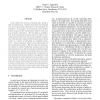Free Online Productivity Tools
i2Speak
i2Symbol
i2OCR
iTex2Img
iWeb2Print
iWeb2Shot
i2Type
iPdf2Split
iPdf2Merge
i2Bopomofo
i2Arabic
i2Style
i2Image
i2PDF
iLatex2Rtf
Sci2ools
232
click to vote
ICDE
2007
IEEE
2007
IEEE
On Randomization, Public Information and the Curse of Dimensionality
A key method for privacy preserving data mining is that of randomization. Unlike k-anonymity, this technique does not include public information in the underlying assumptions. In this paper, we will provide a first comprehensive analysis of the randomization method in the presence of public information. We will define a quantification of the randomization method which we refer to as krandomization of the data. The inclusion of public information in the theoretical analysis of the randomization method results in a number of interesting and insightful conclusions. These conclusions expose some vulnerabilities of the randomization method. We show that the randomization method is unable to effectively achieve privacy in the high dimensional case. We theoretically quantify the degree of randomization required to guarantee privacy as a function of the underlying data dimensionality. Furthermore, we show that the randomization method is susceptible to many natural properties of real data set...
Related Content
| Added | 01 Nov 2009 |
| Updated | 01 Nov 2009 |
| Type | Conference |
| Year | 2007 |
| Where | ICDE |
| Authors | Charu C. Aggarwal |
Comments (0)

